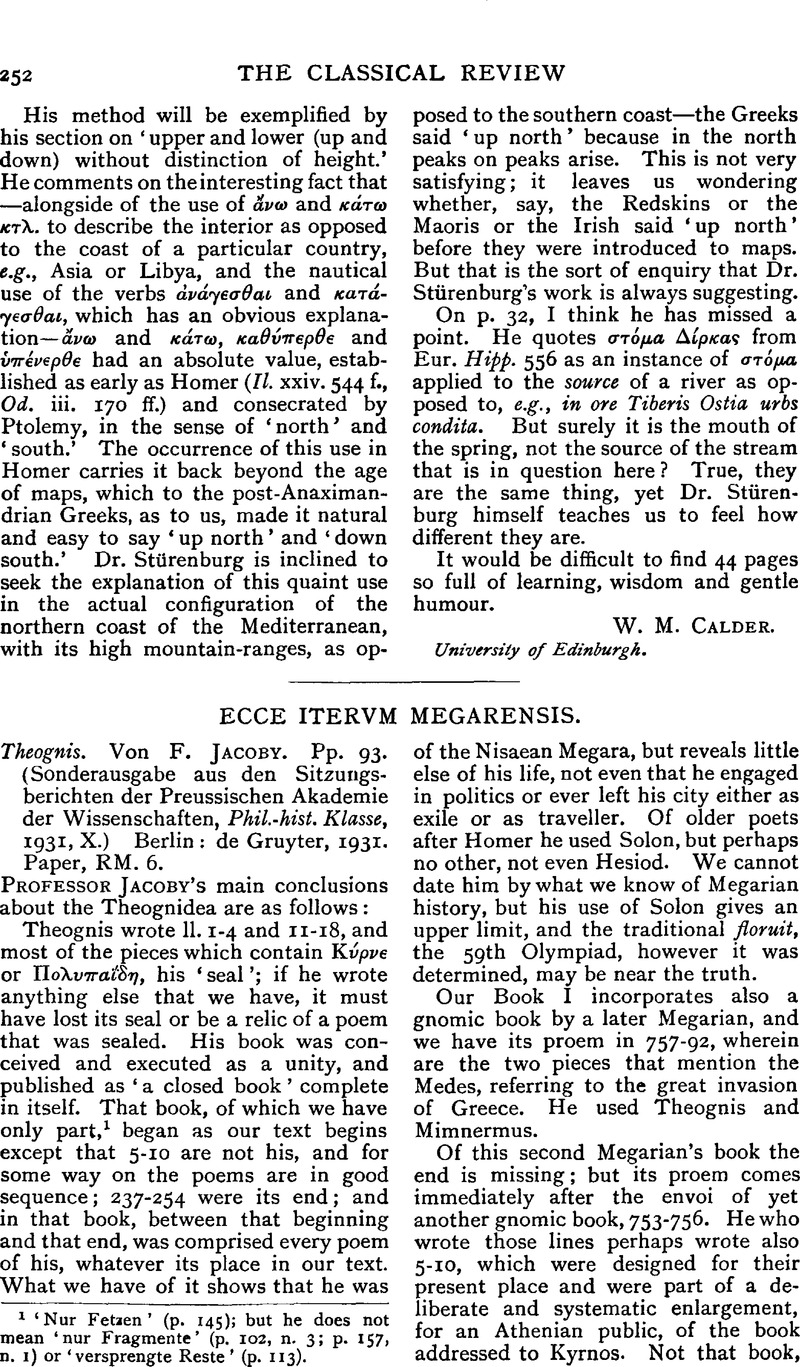No CrossRef data available.
Article contents
Ecce Itervm Megarensis - Theognis. F. Von Jacoby. Pp. 93. (Sonderausgabe aus den Sitzungsberichten der Preussischen Akademie der Wissenschaften, Phil.-hist. Klasse, 1931, X.) Berlin: de Gruyter, 1931. Paper, RM. 6.
Published online by Cambridge University Press: 27 October 2009
Abstract

- Type
- Reviews
- Information
- Copyright
- Copyright © The Classical Association 1932
References
page 252 note 1 ‘Nur Fetzen ’ (p. 145); but he does not mean ‘nur Fragmente’ (p. 102, n. 3; p. 157, n. 1) or ‘versprengte Reste’ (p. 113).
page 253 note 1 Because they describe Apollo's birth in Delos, and Megara had not such relations with Delos as Athens had (p. 107). That the interpolation is ‘vermutlich ’ Attic, and Attica is nearer to the Isthmus than to Sicily, is but a feeble ‘confirmation’ of the reasons for assigning the poet to the Nisaean Megara (p. 132).—His comparison of this poem and its neighbours with the Attic skolia, which among three quatrains addressed to deities have a prayerless quatrain on the birth of Apollo and Artemis, seems to miss the mark. Nor is it noteworthy that those skolia have four lines each; that is the way of quatrains.
page 253 note 2 As in 156 by the source of Stobaeus, in 213 by the worse MSS.
page 253 note 3 In a longer piece, such as 183–192, the second vocative near the end has its value.
page 254 note 1 Jacoby's objections (p. 114) to my suggestion take a narrow view of σοφς and of verbs of the σοφζεοθαι class. See, for example, κακιζμενον, ‘acting like a κακς’ in Il. xxiv. 214.
page 254 note 2 In the ‘end-poem’ 237–254, σο μν γὼ answered loud and clear by ![]() .—It is not true that
.—It is not true that ![]() in 27 has always been ignored. Its needs are satisfied by 23–26.—Jacoby's insensitiveness to the force of these particles is betrayed by his misquotation from 63 on p. 144.
in 27 has always been ignored. Its needs are satisfied by 23–26.—Jacoby's insensitiveness to the force of these particles is betrayed by his misquotation from 63 on p. 144.
page 254 note 3 Equally so whether ![]() be given to πς τισ or not; that turns on the text of 24, Jacoby's reason for thinking that the words must be so given is refuted by ‘ That's Shell—that was!’ By the way, when he says (p. 116) that I regard ‘ἄστοισινγ' οὔπω ’ as ‘Überlieferung,’ his statement is as false as his accentuation; see pp. 2 and 230 of my book.
be given to πς τισ or not; that turns on the text of 24, Jacoby's reason for thinking that the words must be so given is refuted by ‘ That's Shell—that was!’ By the way, when he says (p. 116) that I regard ‘ἄστοισινγ' οὔπω ’ as ‘Überlieferung,’ his statement is as false as his accentuation; see pp. 2 and 230 of my book.
page 254 note 4 But the whole line would show t even if οὔπω meant ‘ nowise.’
page 254 note 5 Hermes 48 (1913), p. 589.
page 254 note 6 Or the last that I know of. See C.R., XXVI (1912), p. 46.
page 254 note 7 Not 1177 f., unless we take Edmonds's view of the optatives. Not necessarily 1103 f., unless Jacoby, like Edmonds, accepts my junction of 1101–4. Not 411–414, unless my more doubtful junction is right. In 371 f. the affection of Kyrnos for the poet is only too strong.
page 254 note 8 The singular γλσσαν does not prove it; see 85, 421, 1163, Soph. O.C. 1052, etc.
page 255 note 1 Such an arrangement as we see, for example, in Anth. Pal. V. 103–132, VI. 87–108.


